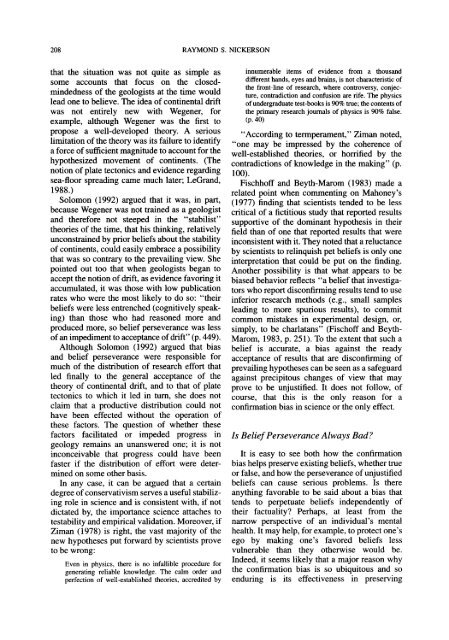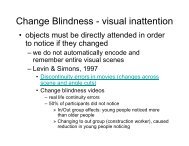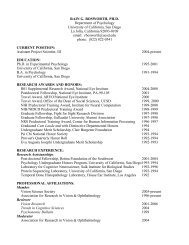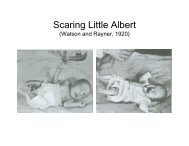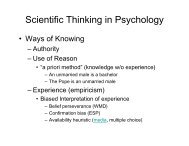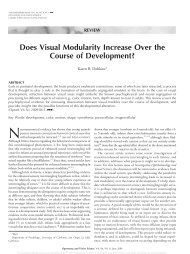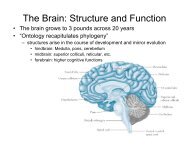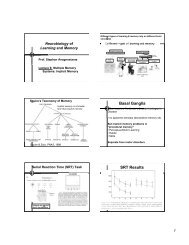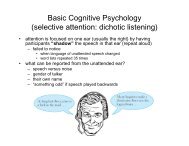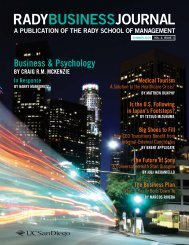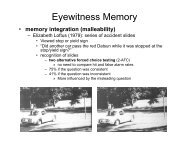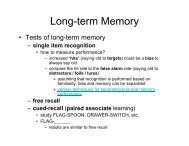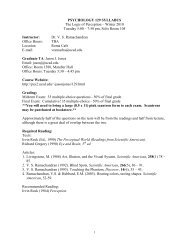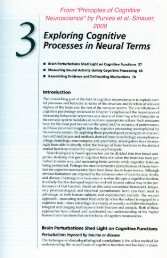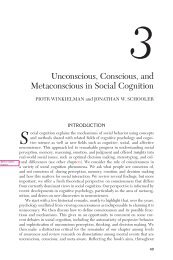Confirmation Bias: A Ubiquitous Phenomenon in Many Guises
Confirmation Bias: A Ubiquitous Phenomenon in Many Guises
Confirmation Bias: A Ubiquitous Phenomenon in Many Guises
You also want an ePaper? Increase the reach of your titles
YUMPU automatically turns print PDFs into web optimized ePapers that Google loves.
208 RAYMOND S. NICKERSON<br />
that the situation was not quite as simple as<br />
some accounts that focus on the closedm<strong>in</strong>dedness<br />
of the geologists at the time would<br />
lead one to believe. The idea of cont<strong>in</strong>ental drift<br />
was not entirely new with Wegener, for<br />
example, although Wegener was the first to<br />
propose a well-developed theory. A serious<br />
limitation of the theory was its failure to identify<br />
a force of sufficient magnitude to account for the<br />
hypothesized movement of cont<strong>in</strong>ents. (The<br />
notion of plate tectonics and evidence regard<strong>in</strong>g<br />
sea-floor spread<strong>in</strong>g came much later; LeGrand,<br />
1988.)<br />
Solomon (1992) argued that it was, <strong>in</strong> part,<br />
because Wegener was not tra<strong>in</strong>ed as a geologist<br />
and therefore not steeped <strong>in</strong> the "stabilist"<br />
theories of the time, that his th<strong>in</strong>k<strong>in</strong>g, relatively<br />
unconstra<strong>in</strong>ed by prior beliefs about the stability<br />
of cont<strong>in</strong>ents, could easily embrace a possibility<br />
that was so contrary to the prevail<strong>in</strong>g view. She<br />
po<strong>in</strong>ted out too that when geologists began to<br />
accept the notion of drift, as evidence favor<strong>in</strong>g it<br />
accumulated, it was those with low publication<br />
rates who were the most likely to do so: "their<br />
beliefs were less entrenched (cognitively speak<strong>in</strong>g)<br />
than those who had reasoned more and<br />
produced more, so belief perseverance was less<br />
of an impediment to acceptance of drift" (p. 449).<br />
Although Solomon (1992) argued that bias<br />
and belief perseverance were responsible for<br />
much of the distribution of research effort that<br />
led f<strong>in</strong>ally to the general acceptance of the<br />
theory of cont<strong>in</strong>ental drift, and to that of plate<br />
tectonics to which it led <strong>in</strong> turn, she does not<br />
claim that a productive distribution could not<br />
have been effected without the operation of<br />
these factors. The question of whether these<br />
factors facilitated or impeded progress <strong>in</strong><br />
geology rema<strong>in</strong>s an unanswered one; it is not<br />
<strong>in</strong>conceivable that progress could have been<br />
faster if the distribution of effort were determ<strong>in</strong>ed<br />
on some other basis.<br />
In any case, it can be argued that a certa<strong>in</strong><br />
degree of conservativism serves a useful stabiliz<strong>in</strong>g<br />
role <strong>in</strong> science and is consistent with, if not<br />
dictated by, the importance science attaches to<br />
testability and empirical validation. Moreover, if<br />
Ziman (1978) is right, the vast majority of the<br />
new hypotheses put forward by scientists prove<br />
to be wrong:<br />
Even <strong>in</strong> physics, there is no <strong>in</strong>fallible procedure for<br />
generat<strong>in</strong>g reliable knowledge. The calm order and<br />
perfection of well-established theories, accredited by<br />
<strong>in</strong>numerable items of evidence from a thousand<br />
different hands, eyes and bra<strong>in</strong>s, is not characteristic of<br />
the front-l<strong>in</strong>e of research, where controversy, conjecture,<br />
contradiction and confusion are rife. The physics<br />
of undergraduate test-books is 90% true; the contents of<br />
the primary research journals of physics is 90% false,<br />
(p. 40)<br />
"Accord<strong>in</strong>g to temperament," Ziman noted,<br />
"one may be impressed by the coherence of<br />
well-established theories, or horrified by the<br />
contradictions of knowledge <strong>in</strong> the mak<strong>in</strong>g" (p.<br />
100).<br />
Fischhoff and Beyth-Marom (1983) made a<br />
related po<strong>in</strong>t when comment<strong>in</strong>g on Mahoney's<br />
(1977) f<strong>in</strong>d<strong>in</strong>g that scientists tended to be less<br />
critical of a fictitious study that reported results<br />
supportive of the dom<strong>in</strong>ant hypothesis <strong>in</strong> their<br />
field than of one that reported results that were<br />
<strong>in</strong>consistent with it. They noted that a reluctance<br />
by scientists to rel<strong>in</strong>quish pet beliefs is only one<br />
<strong>in</strong>terpretation that could be put on the f<strong>in</strong>d<strong>in</strong>g.<br />
Another possibility is that what appears to be<br />
biased behavior reflects "a belief that <strong>in</strong>vestigators<br />
who report disconfirm<strong>in</strong>g results tend to use<br />
<strong>in</strong>ferior research methods (e.g., small samples<br />
lead<strong>in</strong>g to more spurious results), to commit<br />
common mistakes <strong>in</strong> experimental design, or,<br />
simply, to be charlatans" (Fischoff and Beyth-<br />
Marom, 1983, p. 251). To the extent that such a<br />
belief is accurate, a bias aga<strong>in</strong>st the ready<br />
acceptance of results that are disconfirm<strong>in</strong>g of<br />
prevail<strong>in</strong>g hypotheses can be seen as a safeguard<br />
aga<strong>in</strong>st precipitous changes of view that may<br />
prove to be unjustified. It does not follow, of<br />
course, that this is the only reason for a<br />
confirmation bias <strong>in</strong> science or the only effect.<br />
Is Belief Perseverance Always Bad?<br />
It is easy to see both how the confirmation<br />
bias helps preserve exist<strong>in</strong>g beliefs, whether true<br />
or false, and how the perseverance of unjustified<br />
beliefs can cause serious problems. Is there<br />
anyth<strong>in</strong>g favorable to be said about a bias that<br />
tends to perpetuate beliefs <strong>in</strong>dependently of<br />
their factuality? Perhaps, at least from the<br />
narrow perspective of an <strong>in</strong>dividual's mental<br />
health. It may help, for example, to protect one's<br />
ego by mak<strong>in</strong>g one's favored beliefs less<br />
vulnerable than they otherwise would be.<br />
Indeed, it seems likely that a major reason why<br />
the confirmation bias is so ubiquitous and so<br />
endur<strong>in</strong>g is its effectiveness <strong>in</strong> preserv<strong>in</strong>g


